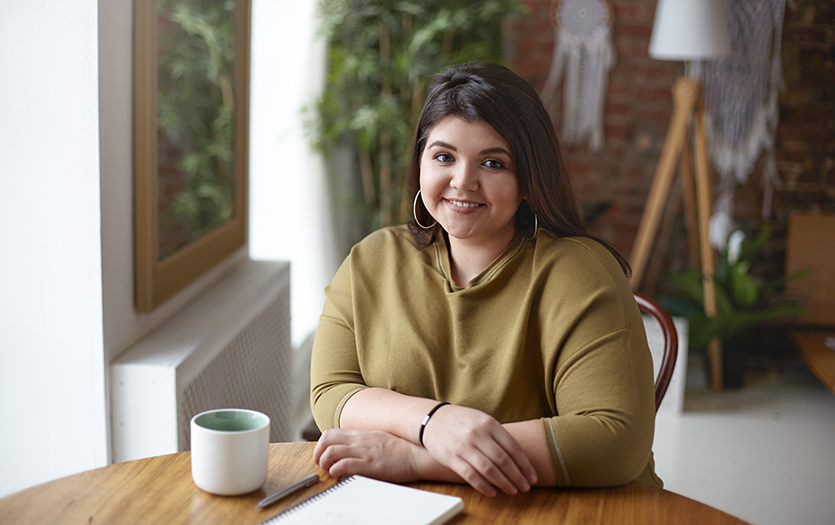
Did you know that your thoughts can have a physical effect on your health? It’s true! By telling yourself encouraging things, you’re sending messages to your brain to produce chemicals that can lower your stress level, make you feel less anxious, happier and more optimistic about the future.
This positive self-talk can also make a big difference in our lives when we apply it to our body image. Many of us have negative thoughts about our bodies. Sometimes it’s hard to know, but start tuning into your thoughts, and see if you do. If you are telling yourself something that makes you feel bad, shift your thinking and remember you are in charge of what you tell yourself. Knowing that your thoughts can have a real effect can help you choose to tell yourself something more encouraging.
How can you learn to feel good about your body?
It can be hard to know what an “ideal” body shape or size is when TV, movies, ads and social media continually show us unrealistic images of what it means to be attractive. Healthy bodies come in all shapes and sizes. Most of us will never look like fashion models or world-class athletes. But when you treat your body well—feed it in healthy ways and move it in ways it’s built to move—you can feel good about it.
When you have negative thoughts about your body, it’s harder to be healthy because those negative thoughts lead to feelings of sadness and anxiety. This can take the joy out of life and take a toll on your physical health as well.
What else can you do to feel more positive about your body?
- Focus on things you like about your body. For example, if you don't like your thighs, think about another part of your body that you do like.
- Share your feelings with someone close to you. We all have negative thoughts about our appearance from time to time. Talking about it with someone else helps you keep those thoughts in perspective.
- Do something nice for yourself. Maybe you could work less today and spend more time with friends or family. Or you could find something that makes you laugh.
- Take time to be grateful. What's one thing you appreciate about your body? Are you healthy and able to be active? That's something to be grateful for.
- Eat well. Sleep well. Be active. The nicer you are to your body, the easier it is to feel more positive about yourself.
- Make social connections. Enjoy some time with family and friends. Look for new ways to connect with people, such as a class, a club, or a community or support group.
Encouraging a healthy body image for your children
Children start to form opinions about their bodies at a young age. Negative feelings about bodies can affect children of any gender, though girls are more likely than boys to feel bad about their bodies. While TV, movies, social media, ads, and pressures from sports and activities all play a role, so can the attitudes of friends and family members. Here are things you can do to help shape a positive body image for your children.
Be positive about your own body. Parents are the early models for kids learning to think about their bodies. Help your child learn to value their body by showing them how you value your own. Don't criticize what you see as your flaws. Instead, try to focus on what you like about your body. What are you grateful it can do? And be careful about how you talk about other people's bodies.
Model healthy habits. Choose healthy meals. Eat lots of vegetables and fruits. Don't skip meals. Look for exercises you can do together and make them part of your daily life. Try not to talk about dieting and exercising to lose weight. Instead, talk about healthy eating and physical activity as a part of being healthy for life.
Take your child's insecurities seriously. It might be hard for you to understand why your child is focused on things like their freckles, their kneecaps, or the size of their calves. Some childhood worries can seem silly or unfounded to parents. But these things are very real to your child. So be a good listener. Ask your child questions about why they feel the way they do.
Compliment qualities that aren't about looks. This helps send the message that your child is much more than how they look. Praise traits like being kind, independent or brave. Give compliments about what your child's body can do, rather than how it looks. Focus on things like strength, balance, and coordination.
Talk about media images. The way people are shown on TV, in ads, and on social media can have a big impact on how a child thinks about their own body. You can help your child learn to recognize problems with these images by talking about them.
Call the doctor if you're concerned. Talk to your doctor if you are worried about changes in your child's behavior or attitude. This may include things like changes in eating or sleeping patterns, school performance or mood. It could also include an increased focus on dieting and weight. If you think your child may be feeling depressed or anxious, your doctor can share resources that can help.
Love yourself and show others the rewards of self-acceptance and appreciation through your example.
Copyrighted material adapted with permission from Healthwise, Incorporated. This information does not replace the advice of a doctor.



